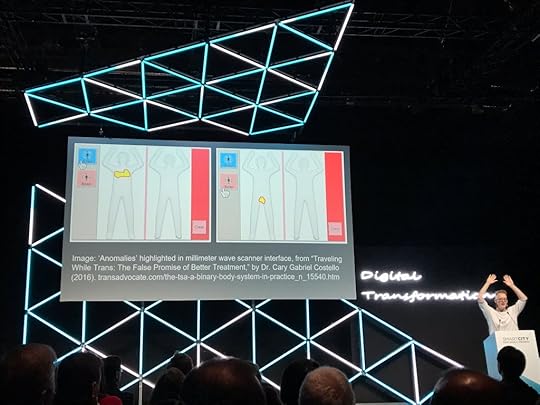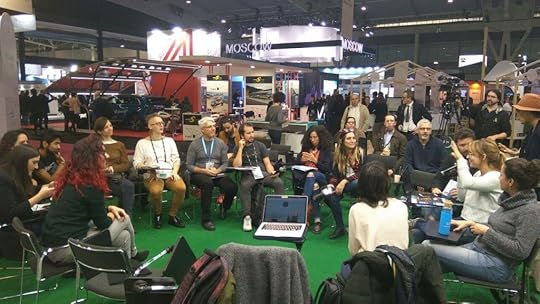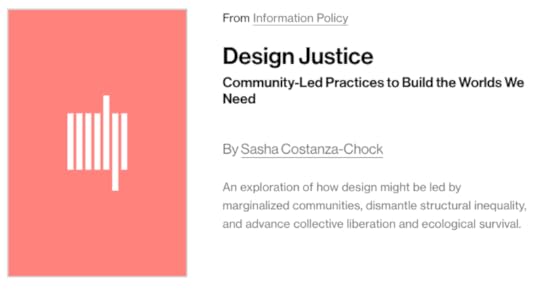Sasha Costanza-Chock's Blog
November 25, 2019
Keynote at the Smart Cities World Expo and Congress 2019

keynoting smart cities

At the workshop in the sharing cities stand lab
I just returned from Barcelona, where I was invited to give a keynote talk on “Design Justice and Smart Enough Cities” at the Smart City Expo and World Conference 2019. While I was there, I also co-led a workshop at the Sharing Cities Stand Lab together with the fabulous folks from the Design Justice Mediterranea Local Node.
My new book arrives in February 2020!
I’m so happy to announce that my new book Design Justice: Community-Led Practices to Build the Worlds We Need will be published by the MIT Press in February 2020. You can pre-order from various booksellers over at the book’s page on the MIT Press site: https://mitpress.mit.edu/books/design-justice!
New article in Public Books: Designing AI with Justice
The phenomenal publication Public Books has posted a lightly edited transcript of remarks that I delivered at the Co-Opting AI: Justice event, held at NYU in New York City on May 13, 2019. In the talk, I discuss three concepts: first, the idea of design justice; second, how people are already resisting oppressive AI; and third, the ten principles of design justice. You can read it for free over on the Public Books site: https://www.publicbooks.org/designing-ai-with-justice.
Keynote at the 2019 Papanek Symposium
In September, I was honored to give a keynote at Real World: Design, Politics, Future: the Papanek Symposium 2019. This event took place inside the Porto Design Biennale, in Porto, Portugal. My talk was titled “Design Justice: Principles, Processes, and Practices to Challenge Systemic Inequalities.” More info: https://papanek.org/symposium-2019.
August 8, 2019
Eyeo Festival

Eyeo logo
This summer I was honored to be invited to speak at the Eyeo Festival. I presented about design justice, in a session with the following description:
Design is key to our collective liberation, but most design processes today reproduce inequalities structured by what Black feminist scholars call the matrix of domination. Sasha will talk about Design Justice, a field of theory and practice that is concerned with how the design of objects and systems influences the distribution of benefits and burdens between various groups of people. Design justice focuses on the ways that design reproduces, is reproduced by, and/or challenges the matrix of domination (white supremacy, heteropatriarchy, capitalism, and settler colonialism). Design justice is also a growing social movement that aims to ensure a more equitable distribution of design’s benefits and burdens; fair and meaningful participation in design decisions; and recognition of community based design traditions, knowledge, and practices. They will conclude with the Design Justice Principles, developed by an emerging network of designers and community organizers, and invite people to get involved.
You can learn more about the Eyeo Festival, and find video of all of the presentations, on their website.
September 3, 2018
#MoreThanCode: Practitioners reimagine the landscape of technology for justice and equity
The report “#MoreThanCode: Practitioners reimagine the landscape of technology for justice and equity,” with recs based on over 100 tech practitioner interviews, is finally out! I’m a report co-author and was part of the coordination team for the past two years. Get it at https://morethancode.cc!
More about the project, from the project site:
The Technology for Social Justice Project (T4SJ) is excited to release a new report, #MoreThanCode: Practioners Reimagine the landscape of technology for justice and equity.
#MoreThanCode is a participatory action research report based on interviews, focus groups, and data analysis with 188 tech practitioners from across the U.S.A. The report explores the current ecosystem and demographics; practitioner experiences; visions and values; documents stories of success and failure; and provides key recommendations for the future of the field. We hope our findings and recommendations will be useful to all those who want to use technology to make a more just and equitable world.
Key recommendations include:
Nothing About Us Without Us: Adopt Co-Design Methods and Concrete Community Accountability Mechanisms;
From Silver Bullets to Useful Tools: Change the Narrative, Lead with Values, and Recognize Multiple Frames and Terms Across the Ecosystem;
#RealDiversityNumbers: Adopt proven strategies for diversity and inclusion;
Developers, Developers, Developers? Recognize Different Roles and Expertise in Tech Work, and Support Alternative Pathways to Participation;
Coops, Collectives, and Networks, Oh My! Support Alternative Models Beyond Startups, Government Offices, and Incorporated Nonprofits.The project is co-led by Research Action Design and the Open Technology Institute at New America, together with research partners Upturn, Media Mobilizing Project, Coworker.org, Hack the Hood, May First/People Link, Palante Technology Cooperative, Vulpine Blue, and The Engine Room. Available at https://morethancode.cc.
Design Justice, A.I., and Escape from the Matrix of Domination
My paper “Design Justice, A.I., and Escape from the Matrix of Domination,” a response to Joi Ito’s Resisting Reduction manifesto, won $10k in an essay competition in the Journal of Design and Science! You can read it here: https://jods.mitpress.mit.edu/pub/costanza-chock
Design Justice: Towards an Intersectional Feminist Framework for Design Theory and Practice
I presented the paper “Design Justice: Towards an Intersectional Feminist Framework for Design Theory and Practice” at the Design Research Society in Limerick this summer. Check out the preprint on SSRN!
https://papers.ssrn.com/sol3/papers.cfm?abstract_id=3189696
Abstract:
Design is key to our collective liberation, but most design processes today reproduce inequalities structured by what Black feminist scholars call the matrix of domination. Intersecting inequalities are manifest at all levels of the design process. This paper builds upon the Design Justice Principles, developed by an emerging network of designers and community organizers, to propose a working definition of design justice: Design justice is a field of theory and practice that is concerned with how the design of objects and systems influences the distribution of risks, harms, and benefits among various groups of people. Design justice focuses on the ways that design reproduces, is reproduced by, and/or challenges the matrix of domination (white supremacy, heteropatriarchy, capitalism, and settler colonialism). Design justice is also a growing social movement that aims to ensure a more equitable distribution of design’s benefits and burdens; fair and meaningful participation in design decisions; and recognition of community based design traditions, knowledge, and practices.
May 30, 2018
Video of Keynote Plenary talk for the Data Justice conference
Last week I had the pleasure to participate in the Data Justice conference in Cardiff, as a keynote plenary speaker. Data Justice was an international conference exploring “research on, and practices of, social justice in an age of datafication.” From the conference description:
The collection and processing of massive amounts of data has become an increasingly contentious issue. Our financial transactions, communications, movements, relationships, all now generate data that are used to profile and sort groups and individuals. What are the implications for social justice? How do we understand social justice in an age of datafication? In what way do initiatives around the globe address questions of data in relation to inequality, discrimination, power and control? What is the role of policy reform, technological design and activism? How do we understand and practice ‘data justice’? How does data justice relate to other justice concerns?
You can find slides for my talk, “In Defense of Data Discrimination,” here, and view a video recording of the plenary session here.
December 10, 2017
The Routledge Companion to Media and Activism
I have a chapter in the soon-to-be-published Routledge Companion to Media and Activism (edited by Graham Meikle)!
My chapter is titled “Transformative media organizing: Key lessons from participatory communications research with the immigrant rights, Occupy, and LGBTQ & Two-Spirit movements.” Here’s the abstract:
The relationship between the media and social movements is hotly contested by scholars and activists alike. However, relatively few studies are grounded in the deep specificity of social movement media practices, and fewer still employ participatory action research approaches. This chapter summarizes findings from a decade of mixed methods participatory action research with three social movements in the United States: the immigrant rights movement (between 2006-2016), the Occupy movement (2011-2012), and Lesbian, Gay, Bisexual, Trans*, Queer (LGBTQ) and Two-Spirit movement(s) (2014-2016). Research methods include surveys, interviews, analysis of media archives, data hackathons and participatory data analysis, and community-based media making workshops. Across the three movements, we found that despite scarce resources, community organizers often have an intersectional analysis of linked systems of race, class, gender identity, sexual orientation, and other axes of identity. Many seek to do media work that develops the critical consciousness and leadership of their communities, create media in ways that are deeply accountable to their social base, use participatory approaches to media making, are strategic and cross-platform in their approach, and root their work in community action. We call this combination of characteristics transformative media organizing, and we believe it describes an emerging paradigm for social movement media practices in the current media landscape.
Here’s more about the book, from the publisher:
The Routledge Companion to Media and Activism is a wide-ranging collection of 42 original and authoritative essays by leading contributors from a variety of academic disciplines.
Introducing and exploring central debates about the diverse relationships between both media and protest and communication and social change, the book offers readers a reliable and informed guide to understanding how media and activism influence each other. The expert contributors examine the tactics and strategies of protest movements, and how activists organize themselves and each other; they investigate the dilemmas of media coverage, and the creation of alternative media spaces and platforms; and they emphasize the importance of creativity and art in social change.
Bringing together case studies and contributors from six continents, the collection is organized around themes that address past, present and future developments from around the world. The Routledge Companion to Media and Activism is an essential reference and guide for those who want to understand this vital area.
Routledge’s site seems to be down at the moment, but for now you can preorder on Amazon, here.







